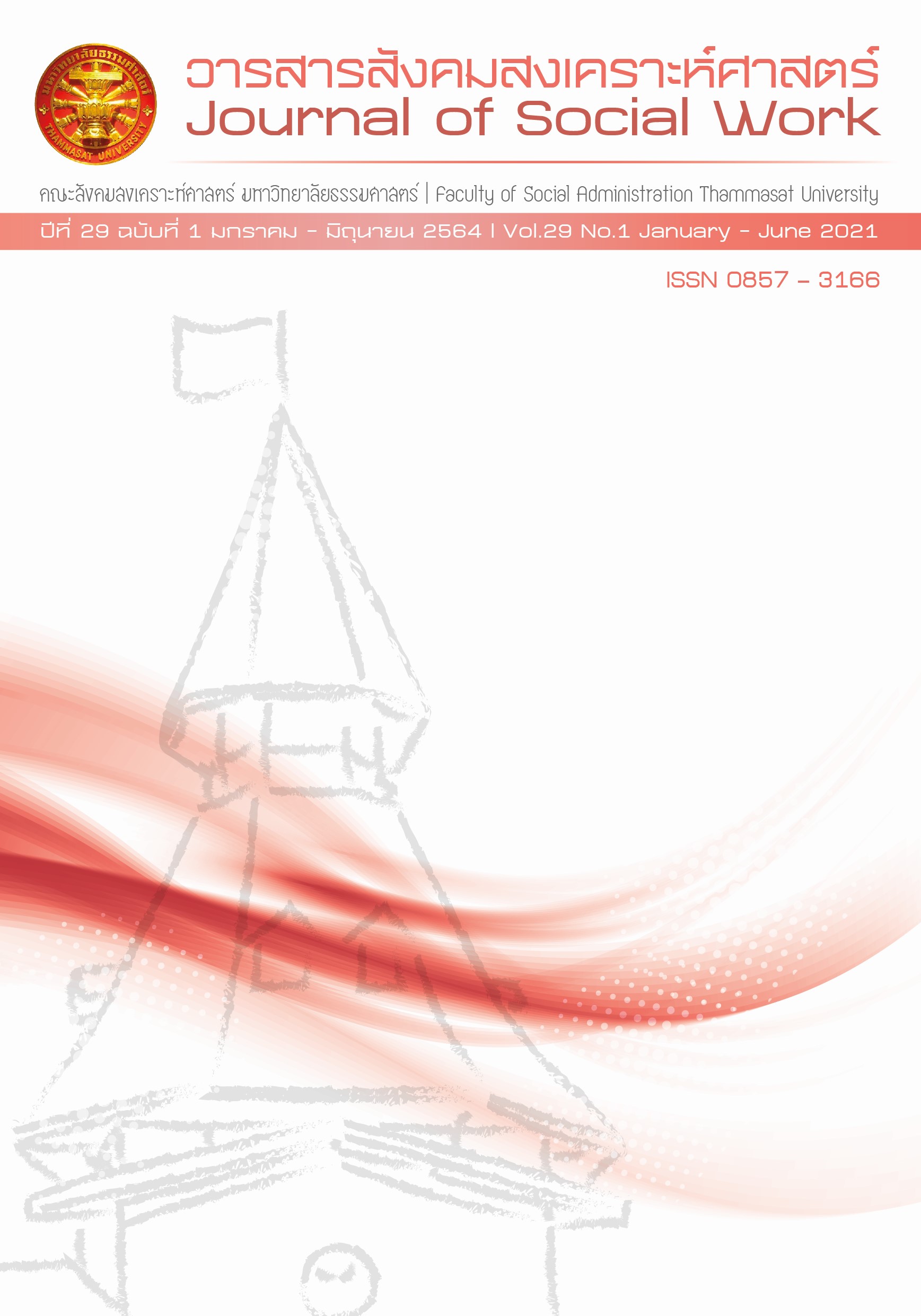Structure, Roles and Strength of Provincial Civil Society Networks Working Group as a Civic Political Mechanism
Keywords:
The Provincial Civil Society Networks Working Group, Civil Politics, SoctatesAbstract
This article aims to study the structure, roles and strength of Provincial Civil Society Networks Working Group in 2014, which was still working at that time. The study was conducted using a qualitative method to observe the network’s meetings and activities, focus group discussion, and in-depth interviews within the conceptual framework of Civil Society, Social Networks, Social Capital. The data was collected from the working group at the level of 6 provincial groups and provincial level including 15 provinces, during May-December 2014. This data analysis uses a content analysis method through understanding and interpreting from local mechanisms and operations compared to the concepts. The study showed that, the structure, roles and operations of the Working Group can serve as a political mechanism for the civil sector practically. It is a structured form that combines informal networking with a centrally defined formal structure according to the Soctates. The Working Group serves as an umbrella organization for each provincial sector to design a balance of collaboration on the capital base and characteristics in their local context in a networked manner. The strength of local capital and networked administration has also empowered the creation of a political space in its own term. Therefore, the suggestion from this study is that, it is necessary to develop a structural system to create a civil political mechanism at the practical level, such as applying the educational concept to create citizenship in recent days and establish a policy structure for the development of a civilian political mechanism at the operational level.
References
โกมาตร จึงเสถียรทรัพย์. (2548). ขับเคลื่อนวาระสุขภาวะไทย: ประชาสังคมกับการปฏิรูประบบสุขภาพ. (พิมพ์ครั้งที่ 2). กรุงเทพฯ: บริษัทสร้างสื่อ จำกัด.
โกวิทย์ พวงงาม, ธัญญาภรณ์ จันทรเวช และชญาภัส พลายโถ. (2557). รายงานฉบับสมบูรณ์ โครงการศึกษาวิจัยเพื่อวัดความเข้มแข็งการเมืองภาคพลเมือง. กรุงเทพฯ: สถาบันวิจัยและให้คำปรึกษาแห่งมหาวิทยาลัยธรรมศาสตร์.
โกวิทย์ พวงงาม, ธัญญาภรณ์ จันทรเวช และชญาภัส พลายโถ. (2558). การขับเคลื่อนการเมืองภาคพลเมืองของเครือข่ายภาคประชาสังคมจังหวัด.กรุงเทพฯ: เสมาธรรม.
ชัยอนันต์ สมุทวณิช. (2541). ประชารัฐกับการเปลี่ยนแปลง. กรุงเทพฯ: บริษัท สุขุมและบุตร จำกัด.
เดวิท แมทิวส์ (เขียน), ฐิรวุฒิ เสนาคำ (แปลและเรียบเรียง). (2540). จากปัจเจกสู่สาธารณะ: กระบวนการเสริมสร้างชุมชนให้เข้มแข็ง. กรุงเทพฯ: สถาบันชุมชนท้องถิ่นพัฒนา.
ทศพล สมพงษ์. (2555). ประชาธิปไตยชุมชนจากแนวคิดสู่การจัดการ. กรุงเทพฯ: บริษัทศูนย์การพิมพ์แก่นจันทร์ จำกัด.
พระมหาสุทิตย์ อาภากโร. (2547). เครือข่าย: ธรรมชาติ ความรู้ และการจัดการ. โครงการเสริมสร้างการเรียนรู้เพื่อชุมชนเป็นสุข (สรส.) กรุงเทพฯ: พิสิษฐ์ไทย ออฟเซต.
ไมตรี อินเตรียะ. (2560). ทุนทางสังคม. วารสารนาคบุตรปริทรรศน์. 9(2), 14-25.
สำนักงานคณะกรรมการพัฒนาการเศรษฐกิจและสังคมแห่งชาติ. (2548). ทุนทางสังคม ฉบับประชาชน. กรุงเทพฯ: 21 เซ็นจูรี่.
อานันท์ กาญจนพันธุ์. 2541. การระดมทุนเพื่อสังคม. กรุงเทพฯ: สถาบันชุมชนท้องถิ่นพัฒนา.
อภิญญา ดิสสะมาน (2562). บทบาทของาพัฒนาการเมืองกับการปฏิรูปการเมืองไทย. สถาบันพระปกเกล้า. สืบค้นจาก
http://www.kpi.ac.th/knowledge/book/data/492
อุไรวรรณ ธนสถิตย์. (2556). บทบาทของสภาพัฒนาการเมืองกับการเสริมสร้างความปรองดองแห่งชาติ. มหาวิทยาลัยหอการค้าไทย. สืบค้นจาก https://searchlib.utcc.ac.th/library/onlinethesis/246029.pdf
Downloads
Published
How to Cite
Issue
Section
License
The manuscripts published in the Social Work Journal is the copyright of the Social Work Journal, Thammasat University
Any article or opinion appeared in the Social Work Journal will solely be under the responsibility of the author The Faculty of Social Administration, Thammasat University and the editors do not need to reach in agreement or hold any responsibility.



